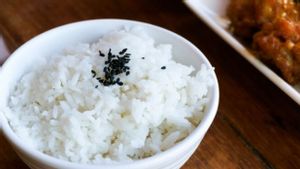JAKARTA - When you start introducing solid food and new food to your baby, there are several allergens that you have to be aware of. Especially if in the family there is a history of allergies, such as eczema and asthma problems. Or if the baby has a bad reaction to soy or cow milk-based formulas.
Some of the most common foods that cause allergies to babies are as follows:
Mothers, native cow's milk should not be given to children until she reaches the age of one year. Because in that age range, children still need nutrition for growth and development obtained from breast milk or formula. Meanwhile, cow's milk does not provide the nutritional benefits needed by the baby. You can add yogurt to the choice of baby's diet once he starts to be introduced with solid food, provided that the child must be given breast milk or previous formulas.
Orak-arik eggs are attractive food for babies who learn to eat on their own. Slaughtered eggs or boiled eggs that are thinly cut can also be a choice of finger food for children. But, in some cases, egg allergies can cause anaphylaxis. The three proteins that cause egg allergies are ovomucoid, ovalbumin, and conalbumin.
Fish allergies in babies often cause severe reactions, including anaphylaxis. Adults are more likely to have this allergic reaction than children. Choosing lower mercury fish and higher omega 3 DHA fat is a great idea, such as salmon or sardines. Make sure to remove all bones from cooked fish before they are given to the baby.
The allergy of peanuts is very common in babies and can cause severe allergic reactions and has the potential to be fatal. Babies born from families with a history of peanut allergies are most at risk of developing the same allergies.
If you want to test whether your child has a peanut allergy or not, you can dilute with water or breast milk or formula before giving it to the baby. It can also be applied thinly to a piece of grilled bread that is cut into pieces that can be held by a baby or stirred into fresh yogurt or oatmeal.
另请阅读:
Soybean allergies in babies affect about 0.4 percent of children and are most often found in infants and children under 3 years old, as quoted from the Healthline health site. Allergies are triggered by protein in soybeans or products that contain soybeans.
However, about 70 percent of babies who are allergic to soybeans can cope without treatment. Symptoms include itching, itchy mouth, runny nose, rash, asthma, or difficulty breathing. In rare cases, soybean allergies in babies can also cause anaphylaxis.
The English, Chinese, Japanese, Arabic, and French versions are automatically generated by the AI. So there may still be inaccuracies in translating, please always see Indonesian as our main language. (system supported by DigitalSiber.id)


















